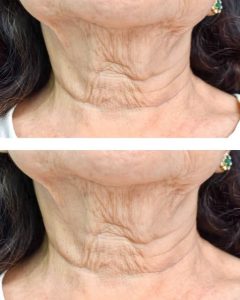
What Happens When You Don’t Get Enough Vitamin C
A lack of vitamin C can negatively affect your skin’s health. Without enough vitamin C, collagen production slows down, leading to looser skin and the formation of wrinkles. Additionally, your skin becomes less effective at repairing itself from damage caused by sun exposure and pollutants, which speeds up the aging process. Over time, this can make wrinkles more noticeable and your skin appear less youthful.
Where to Find Vitamin C in Your Diet
To make sure you’re getting enough vitamin C, include a variety of vitamin C-rich foods in your diet. Citrus fruits like oranges, lemons, and grapefruits are great sources. Other excellent options include strawberries, kiwi, bell peppers, broccoli, Brussels sprouts, and spinach. By incorporating these foods into your daily meals, you’ll help support healthy skin and prevent vitamin C deficiency.
The Benefits of Topical Vitamin C for Skin
In addition to getting vitamin C from food, you can also apply it directly to your skin through serums and creams. Topical vitamin C can brighten your complexion, reduce dark spots, and improve skin firmness. It works by neutralizing free radicals on your skin’s surface and forming a protective barrier against environmental damage. Regular use of vitamin C skincare products can help achieve a radiant, youthful look.
How Much Vitamin C Do You Need?
The recommended daily intake of vitamin C varies depending on age and gender. Adult women should aim for 75 mg per day, while adult men should aim for 90 mg. Pregnant or breastfeeding women may need more. Smokers should consume an extra 35 mg daily due to the higher oxidative stress caused by smoking. While it’s possible to meet these requirements through a balanced diet, supplements are an option if you’re not getting enough from food.
Symptoms of Vitamin C Deficiency
Vitamin C deficiency can show up in several ways, particularly through skin issues. Common symptoms include dry, rough skin, slow wound healing, and tiny red spots on the skin due to weakened blood vessels. In more severe cases, it can lead to scurvy, which causes bleeding gums, joint pain, and fatigue. If you notice any of these signs, it’s important to check your vitamin C intake and talk to a healthcare professional.
Tips for Boosting Your Vitamin C Intake
To increase your vitamin C intake, consider adding more fruits and vegetables to your diet. Start your day with a glass of orange juice or a vitamin C-packed smoothie. Snack on bell peppers or strawberries for a healthy treat. When shopping for skincare products, look for ones that contain stabilized forms of vitamin C, such as ascorbic acid or sodium ascorbyl phosphate, for maximum effectiveness. Consistency is key, so make sure vitamin C is part of your daily routine.
Conclusion: Keep Your Skin Healthy with Vitamin C
Vitamin C is an essential nutrient that plays a key role in maintaining skin health and preventing premature aging. By supporting collagen production and offering antioxidant protection, vitamin C keeps your skin firm, elastic, and youthful. Ensuring you get enough vitamin C through your diet and skincare routine can help prevent skin problems like wrinkles and loss of elasticity. Make vitamin C a priority for healthy, radiant skin!